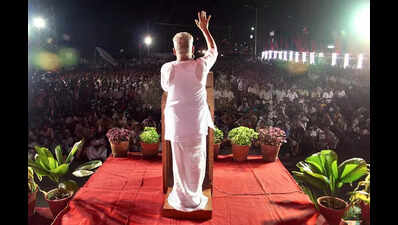ARTICLE AD BOX

How will history remember V S Achuthanandan, a lifelong communist whose legacy refuses to be confined to a single frame? Having been ideologically associated with him for many years, I believe he should be remembered not just as one of the founding members of CPM or as a popular leader who rose to the position of chief minister despite facing significant challenges from his own party.
More importantly, he was someone who championed a new kind of Left politics in the era of economic liberalisation and proved that an alternative politics, rooted in people's issues, was not only necessary but entirely possible.VS recognised early on that the communist party had to evolve to stay relevant. His politics became an amalgam of concerns such as feminism, environmentalism, land rights and equity. Despite being a prominent leader, VS didn't become a mass figure like EMS Nambudiripad and A K Gopalan until the late 1990s.
His life can be divided into distinct stages, each shaped by the turbulence of his political career.In his early years, VS was an uncompromising militant communist activist. He was part of the Punnapra-Vayalar uprising, Kerala's only armed struggle by communist party, when he went underground, courted arrest and endured torture. These early struggles were common to the generation that laid the foundation of the communist party in the state.
Poll
Do you believe V S Achuthanandan's approach to politics was innovative?
Yes, he redefined Left politicsNo, it was a continuation of past ideologies
W
hen the first Communist govt came into being in 1957 and the split that led to CPM's formation in 1964, VS donned key leadership roles. Until 1996, he remained a disciplined, uncompromising organisational man. His political style was radical, often militant, which is why he chose to be with the CPM while numerous leaders he previously associated with stayed with CPI, seen back then more as a centrist organisation.VS's legacy can be compared to that of P Krishna Pillai. Like Pillai, VS stood apart — a lone tusker, as we often said. EMS was a tall leader, under whose shadow many leaders preferred to stay but VS was distinct. What I have observed is that at each of the party meetings involving EMS and VS, they always sat seats apart and never near each other. It was perhaps due to their own distinct opinions on issues. In 1996, the state committee selected VS as the CM candidate, which was approved by the central leadership.
But he lost from Mararikkulam, a result many of us believe was engineered by sections within the party. Despite the setback, the turning point in VS's public image had arrived. The man who had operated within the party's rigid structures began to reinvent himself.He started addressing people's issues — women's rights, environmental degradation and agrarian distress — with new intensity. His campaign to preserve Kerala's paddy fields — protesting the shift to cash crops like coconut — was visionary.
Looking back, many of his warnings have proved accurate. But this transformation earned him the label of a ‘revisionist' within the party.As opposition leader after the 2001 defeat, VS delivered a performance unparalleled in modern Kerala politics. He brought critical issues to the assembly — rape cases, land encroachments, environmental destruction — and toured the state relentlessly, rain or shine. For many environmental activists, he became the final hope, someone who would listen, take notes and act.VS also mastered the new media landscape. He became a favourite of the press, regularly engaging with television journalists and presenting his version of a rejuvenated Left agenda. His popularity soared. In 2006, as chief minister, VS stayed true to his convictions. From removing encroachments on MG Road in Kochi to taking on illegal plantations in Munnar — even when it meant challenging CPI offices — he never backed down.
His boldness stood in sharp contrast to then state secretary Pinarayi Vijayan, who increasingly aligned with corporate interests.Though he withdrew from public life due to age-related ailments, VS's influence remained. The continued resistance to projects like K-Rail can be traced back to his groundwork. As chief minister, he ensured that public support remained at the heart of governance, making him one of Kerala's most loved leaders.
The chant "Kanne Karale VS-ey" was more than a slogan — it was a people's tribute.But there was disillusionment too. Between 2011 and 2016, VS contemplated leaving the party several times. He was deeply troubled by what he saw as rightward shifts under Vijayan. "The party is moving away from its communist roots," he would say. Although age stopped him from forming a new party, the idea of an alternative Left never left him.VS's life is not just the story of a political leader but of a relentless fighter who kept reinventing himself to stay true to the people. He stood firm when the party faltered, listened when others silenced and led when leadership mattered most.(Writer is a poet and a Left fellow traveller)



.png)
.png)
.png)
















 6 hours ago
5
6 hours ago
5







 English (US) ·
English (US) ·